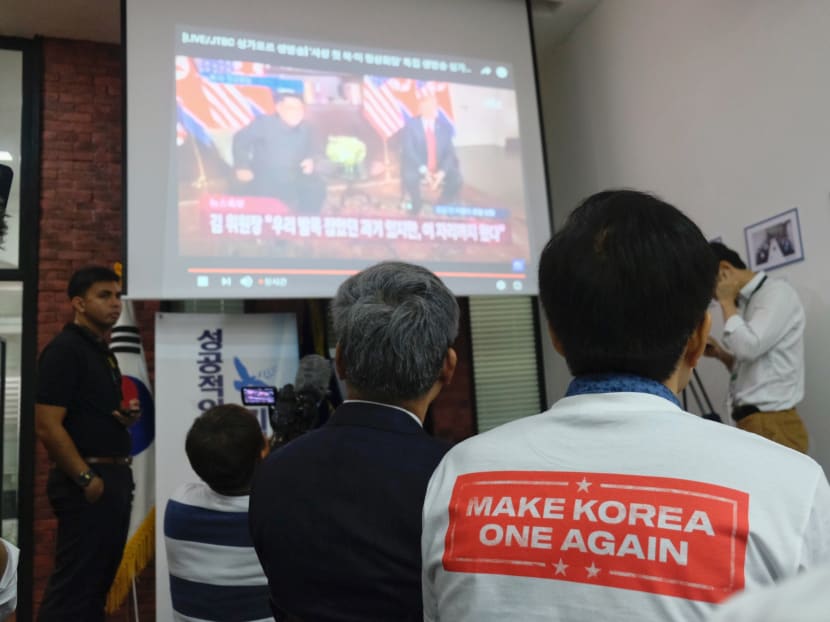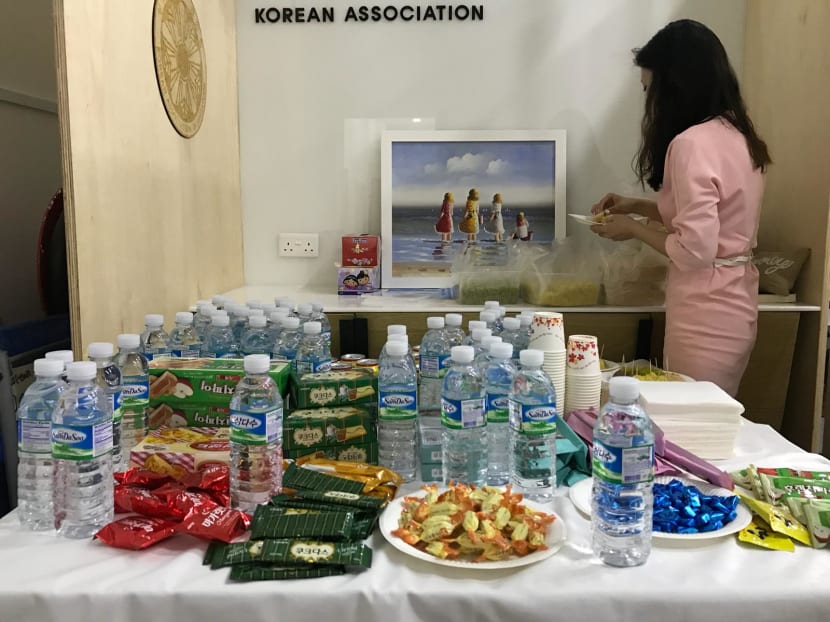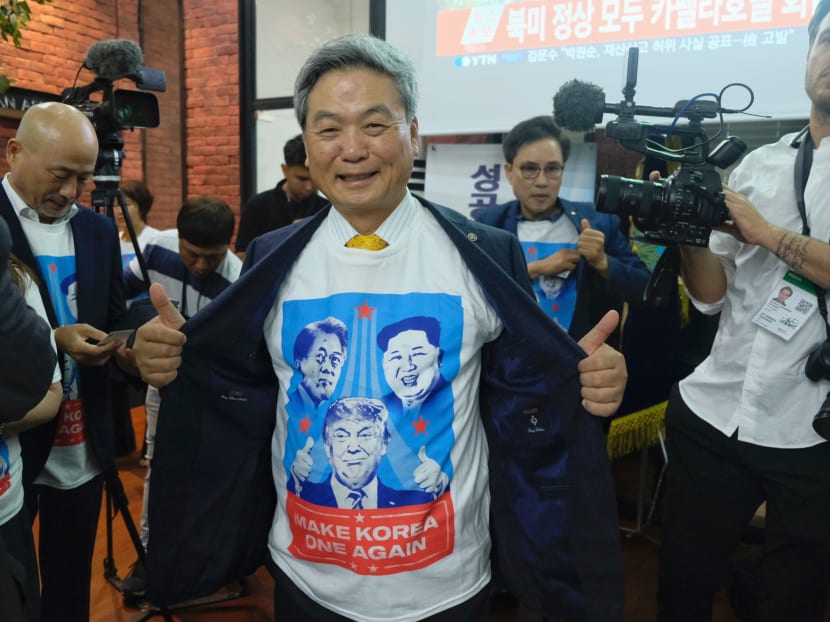Emotional moment for South Koreans witnessing Trump-Kim meet, but doubts linger on
SINGAPORE — South Koreans in Singapore gathered to witness what they had thought was unthinkable in their lifetime: A historic handshake between United States president Donald Trump and North Korean leader Kim Jong-un.

South Koreans watch a live stream of the historic meeting between US President Donald Trump and North Korean leader Kim Jong-un at the Korean Association in Singapore, June 12, 2018. Photo: Chng Shao Kai/TODAY
SINGAPORE — South Koreans in Singapore gathered to witness what they had thought was unthinkable in their lifetime: A historic handshake between United States president Donald Trump and North Korean leader Kim Jong-un.
Glued to television screens, they watched the progress of the summit on Tuesday (June 12) and punctuated the proceedings with loud cheers and applause. South Koreans who spoke to TODAY were emotional, and expressed hope that peace was finally within reach between the two sides, which are technically still at war because the Korean War in the 1950s ended with a ceasefire and no formal peace treaty.
There was relief, though tinged with a healthy scepticism afterwards, as they watched the two leaders sign a deal to commit to work towards a peace regime in the Korean peninsula — with the American side to provide security guarantees, while North Korea commits to complete denuclearisation.
At the Tanjong Pagar shophouse office of the Korean Association in Singapore, which is made up of South Korean members, the thoughts of one Choi Nam Sook, 63, went immediately to her family.
The occasion was extra poignant for the managing director of a timber trading company because her mother was a North Korean working in Pyongyang as a nurse, before she was captured by the South Korean army during the Korean War. Ms Choi, who found this out only when she was 16, said that she had felt her identity was split between the two divided sides.
“We’ve been separated for 65 years, but we’re the same race and speak the same language and those (in the north have led) a different life for a long time... (though) we can’t expect changes to come in a short time,” she acknowledged.
However, she remains hopeful. "(This is a) big moment for all of us," she told TODAY, a sentiment shared by the 30 to 40 members there.
A sense of amazement permeated the gathering as well, not least because Mr Kim and Mr Trump’s suspicions of and aggression towards each other is well-known. Having seen so many "bad gestures and bad talking" exchanged between both men, Mr Yoon Duck Chang, 56, was awed by the historic meeting.
The president of food distributing firm Koryo Trading said: "This year, Mr Kim has shown that he's changing, that he is starting to make friends (with the rest of the world)."
In the past year, Pyongyang has intensified nuclear and missile and Mr Trump has piled on the pressure with sweeping sanctions and hostile rhetoric towards North Korea, and the threat of war often loomed large.
Since taking power last May, South Korean president Moon Jae-in has been asking to have a dialogue and meeting with Mr Kim, which he successfully did two months ago, and also pushing for Mr Kim to meet the US president.
Though there was talk earlier that Mr Moon may join the summit in Singapore, it did not materialise in the end. While some South Koreans were disappointed, Ms Lee Sook Jin, 56, vice-chairperson of the National Unification Advisory Council, told TODAY that the South Korean president will play a part "when the time is right".
"We've been waiting for nearly half a century (for such big changes)... and it's (amazing) this has happened... The important thing is to look at Mr Kim's actions in the present and (whether he follows through)."
From as early as 7am, the Korean Association in Singapore’s office was packed with people in high spirits, ready to watch the live telecast of the summit which took place at Capella hotel on Sentosa Island.
While waiting, they feasted on a spread of snacks and rice cakes. They also wore illustrated T-shirts specially printed for the event and featuring the faces of Mr Moon, Mr Kim and Mr Trump, with the slogan "Make Korea one again".

The association’s members even re-enacted their own "historic handshake" — with one end of the table playing the US, and the other end playing North Korea.
Mr Bong Se Jong, 61, chairman of the Korean Chamber of Commerce in Singapore, said that he had specially driven past the Shangri-La and St Regis hotels in the morning just to soak up the atmosphere and the "sweet air". "It felt good," he said.

Elsewhere, away from the association’s festivities, there were those who were doubtful about whether Mr Kim will “keep to his promise”.
Ms Kim Ji Hyeon, a 23-year-old sales and marketing executive who has lived in Singapore for the past four years, said: “We believe Kim Jong-un can’t easily give up his nuclear weapons, as that’s what he only has.”
Her colleague, Ms Lee Ae Jin, 36, had a similar view. “It won’t be immediate, but we consider this a long-run (effort),” the Singapore permanent resident who works as a sales and marketing manager said.
Ms Cho Su Min, 25, an employee at Super Star K BBQ restaurant, wondered if Mr Kim could have been strategically putting on a show at being a “nice guy” only because the whole world was closely watching the summit — referring to the images of his late-night sightseeing jaunt around Marina Bay that went viral on social media.
Agreeing, another service crew at Chicken Up restaurant, Mr Jackson Seo, 24, said that the North Korean leader would always “behave (nicely in front of the cameras), but threaten another country the next moment”. The sweeping changes people long for would not happen so soon, but perhaps in another 10 years, he predicted.
However, Ms Choi felt that while Mr Kim was an unpredictable figure, his geniality and commitment at the summit to bring about changes “implied a lot” about the shifts afoot.
The joint declaration was a “big symbol”, she added, urging Pyongyang to show a timetable for denuclearisation.
Mr Seol Dong Min, 24, who has lived in Singapore for eight years, was “not 100 per cent confident” that Mr Kim will denuclearise completely despite the pledge.
The customer service executive noted that North Korea has historically been “say only, no action”. “At one point, I just thought that it may be just lip service to ease the sanctions.”
Still, Mr Seol acknowledged that the summit was a big first step for the two Koreas, the US and the rest of the world. He hopes that the outcome of the meeting will pave the way for his grandmother — who has been separated from her family in North Korea since the Korean War — to return to her hometown.
He does not expect major changes in a matter of months, but “maybe a few years after”.
As for hopes of reunification, there are those who feel that even if it does happen in future, it may bring up new problems.
Ms Katherine Choo, 47, director of interior firm Baum Project, said that her late grandmother had lived in North Korea, but she has never known her. Ms Choo worries that when the two Koreas become one, there might be possible clashes in culture and unequal economic development. "I think we should take it step by step, if not things may turn out a mess."
Doubts aside, Mr Lee Kyuhong, 39, an auditor who is on a business trip to Singapore, affirmed that the summit has “very important meaning” to the South Koreans and was also significant for global peace.
Many South Koreans expect the summit to herald the start of good relations between the two Koreas, he said. It would also allow North Korea to open up its economy, which would be “good for North Koreans” after decades of isolation.








